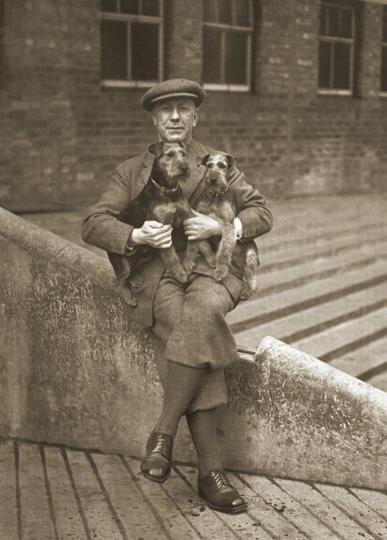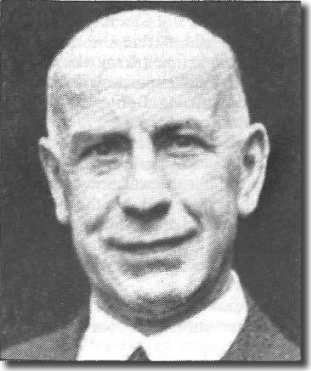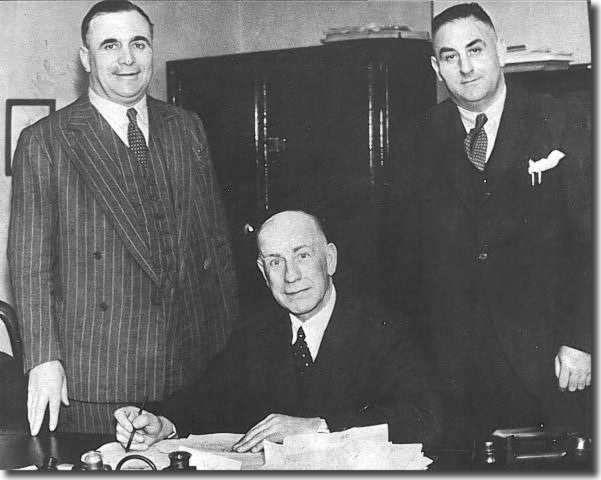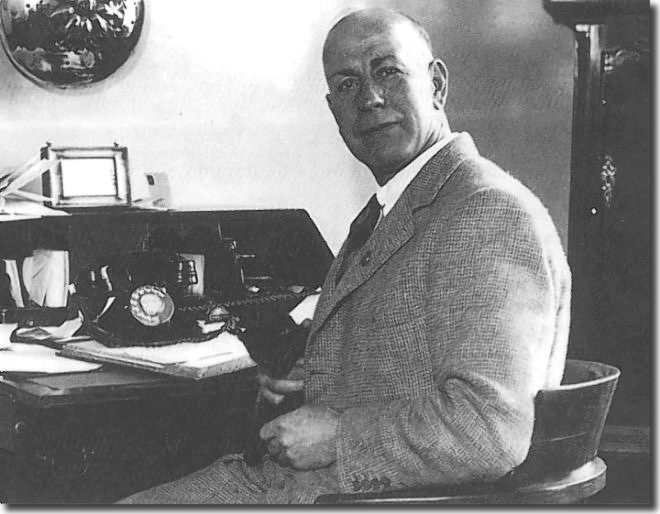 |
 |
 |
Major Frank Buckley was the first professional manager of the modern
school Buckley was born on November 9 1883 in Urmston, Manchester. He fought
in the Boer War around the turn of the century and acquired the rank of
Major after fighting with the 17th Middlesex Regiment during World War
I, where he commanded the 'Footballers' Battalion,' a unit made up of
professional players. As a player he was a tough centre-half and his career was unusual at
the time for the number of clubs he played for - he turned out for Aston
Villa, Brighton, Manchester United, Manchester City, Birmingham, Derby
County and Bradford City. He was a good enough footballer to win a single
cap for England against Ireland in 1914, although the match ended unhappily
in a 3-0 defeat. After the war, Buckley returned to the game and continued to be known
as the Major. He was appointed manager at Norwich City who joined the
newly formed Third Division (South). However, due to a crisis at the club
six directors resigned, many players left and Buckley also quit. He then
spent some time as a commercial traveller. On 6 October 1923, the directors of Second Division Blackpool appointed
him as their new manager. He stayed at Blackpool for a period of four
years and there is no doubt that his shrewd managership greatly assisted
the advancement of the club, although they never gained promotion. His
contribution to the club was immense. It was Buckley who dressed the players
in tangerine for the first time, instituted a proper youth system, and
invested greater resources in Blackpool's scouting network - all initiatives
that would serve the club well for decades to come. One of Buckley's final contributions to the Seasiders was the signing
of Jimmy Hampson, an energetic centre forward who came from Nelson for
a modest £2,000. Once at Blackpool, Hampson scored 31 goals in his first
full season, 1927-28, then 40 the following year and 45 the year after
that, the last enough to bring the Second Division title to Bloomfield
Road. However, it was at Wolverhampton Wanderers that Frank Buckley really
made his name. He joined them in 1927 and developed a marvellous youth
policy. The seeds of the greatness that Wolves went on to achieve in the
1950's (three championships, three times runners up, twice Cup winners),
were sown in Buckley's 17 year reign. He was a strong manager, who, skillfully
trading in the transfer market, developed a homespun side at Molineux
which, but for the war, might have become as dominant as the Wolves team
of the Fifties. When he arrived at Molineux, the club were a struggling Division Two
side, having lost their First Division status in 1906. The Black Country
club had been founder members of the Football League in 1888, and won
the Cup in 1893 and 1908, but those glorious days were long gone. They
missed relegation to Division Three by just three points in both 1928
and 1929, but by 1932 the Buckley magic was working as the club won the
Second Division championship, finishing a couple of points above runners-up
Leeds. In Buckley's early years at Wolves, he signed some outstanding players,
notably Walter Bottril, Charlie Phillips, Bryn Jones, Dai Richards and
Alf Tootill and he also brought through future England half backs and
captains Stan Cullis and Billy Wright. Having re-emerged in the top flight, Buckley's Wolves team struggled
initially, avoiding relegation the first year by just a couple of points.
Gradually, however, Buckley managed to rebuild the club to such an extent
that they were runners up in the League in both 1938 and 1939 and were
one of the most feared sides in the country. In 1938, the title race went right to the wire. Wolves went into the
last day of the season a point ahead of second placed Arsenal, but they
lost to Sunderland. Arsenal put five goals past Bolton to sneak through
at the death and leaving Buckley and his young Wolves wondering about
what might have been. At the start of the 1938/39 season, the Gunners were seeking a replacement
for schemer Alex James, who had recently retired. They broke But Buckley was not always as shrewd in identifying youthful talent.
Future England captain Billy Wright joined Wolves at the age of 14 and
made his first team debut in October 1939, at 15. Buckley was not over
impressed with his apprentice and threatened to send him home because
he was too small at 5ft 3in. Fortunately for Wolves, Buckley relented.
After he tried Wright in various positions in his early days (Wright thought
his natural position was on the right wing) he established himself as
a half-back Buckley was one of the first managers to appreciate the value of publicity.
When he introduced injections for the Molineux playing staff the press
maintained that this was 'monkey gland' treatment, calculated to make
Wolves, already well known as one of the fastest teams in the league,
even quicker to the ball and in the way their movements developed. The
flames of rumour were fanned by Buckley who knew instinctively how beneficial
the interest in the club would be. It was all nonsense of course. The
injections were merely the primitive anti-flu affairs of those days and,
in any event, the ploy sadly backfired when Wolves, in 1939 the hottest
favourites to win the Cup in years, went down 4-1 to Jack Tinn's spats
and his unfancied but workmanlike Portsmouth side. Buckley did, however, send a number of his Molineux squad to a psychologist
in his search for the elusive confidence that is so important to footballers. Buckley's chief contribution to the subsequent Wolves success lay in
his selection of Stan Cullis as captain of the club. Cullis, a natural
leader of the old school, already believed in hierarchy and discipline,
a faith further developed by his wartime service in the Army. When Stan
Cullis retired following Wolves missing out on the championship again
at the end of 1946/47 he was the obvious choice to become the next manager
at Molineux. Cullis continued the regime introduced by Buckley, hard work
in training, strict discipline at the club and all out attack on the field. After 17 years at Molineux, Buckley decided to end what had been described
as a contract for life in February 1944, following the retirement of his
greatest ally, chairman Ben Matthews. He moved on to Notts County of Division
Three, where he was paid £4,000 a year. He didn't achieve much in his
couple of years at County and within hours of his resignation in January
1946, he took charge at Hull City, another Third Division side. As ever, Buckley continued to have a flair for publicity and in March
1948 he persuaded First Division Derby County to sell Raich Carter for
a nominal fee. As well as playing, Carter would also be Buckley's assistant
manager. But it was only a temporary partnership and when Buckley resigned
within weeks, Carter was given complete charge and Hull's attendances
boomed. After the resignation of Dick Ray as Leeds United
manager in 1935, the Elland Road club had turned to former players with
little managerial experience: Billy Hampson
was reasonably successful prior to the war in that he maintained their
First Division status, although an over dependence on an ageing and out
of form squad cost him his job in 1947 as Leeds plummeted to relegation;
former United captain Willis Edwards replaced
Hampson, but was a disastrous appointment and Edwards was lucky to keep
the club out of the Third Division. He was demoted a year after he took
over. Realising Leeds had often struggled financially and the business acumen of Buckley
was another attraction for them. In his time at Molineux he had generated
a £100,000 profit one year and he was good at discovering and selling
young talent, something he would have the opportunity to practice at Elland
Road. Leeds fans remember Buckley for discovering John Charles, who signed
for the club on his 17th birthday on 27 December 1948 and went on to become
one of the biggest British stars of the 1950's. Buckley cleared out all the club's old players and raised the admission
prices at Elland Road. In his first season, Leeds finished 15th. He had
stopped the decline, with the team also showing promising signs. Tommy
Burden, recommended by Willis Edwards, was signed from Chester. Buckley
had known him since he was a teenager from his days at Wolves. He became
captain and was very popular. Burden had the player's respect. Buckley brought innovation and eccentricity to Leeds. He introduced dance
training to improve the players' agility and balance, with the PA blaring
out music on the Elland Road pitch, and a number of odd mechanical devices,
all designed to improve the players' skill with the ball. He also tried
his 'monkey gland' trick again, but this time used a combination of injections
and capsules. How effective these new methods were is debatable, but they
certainly encouraged public interest in what was now a modest Second Division
side. Buckley was still remarkably fit and could do press ups and high
kicking tricks with the best of them. He organised and refereed practice
matches for the younger players. Buckley's methods had sharpened things up. 'At Leeds, there were never
training sessions such as they had at Wolves where players would come
in the morning and go out running in spiked shoes,' Tommy Burden recalls.
'In his last season, Tom Holley only used to train at night. Buckley was
a shock to Leeds United. He couldn't bear a player who only had one foot.
He felt that if you earned your living at football you should be able
to use both feet. He had a go at me about it in front of the rest of the
players. I remember him looking at his little Welsh terrier and saying,
'You've got a better left foot than him, haven't you?'' Buckley had an abrasive side to his character and soon fell out with
inside forward Ken Chisholm, an assertive Scot who had served in the RAF
as a fighter pilot and scored 17 goals in 40 League matches for Leeds.
'Ken was a character - a good goal poacher who liked to go out with the
lads for a drink. Buckley told him, "This city's not big enough for
both of us and I'm not going,"' Jimmy Dunn recalls. So ultimately
Chisholm went - to Leicester City in an exchange deal that brought Ray
Iggleden to Elland Road. The new Leeds manager cut an extraordinary figure. 'He spoke like an
upper class gentleman. I remember him bawling out Len Browning one day
for not saying good morning,' says Burden. 'He always wore Oxford bags
and his shoes were hand welted, shining to perfection. You didn't call
him Frank, you called him Major.' As at Molineux, Buckley developed a strong youth policy and built impressive
sides, despite continuing financial difficulties. He never got Leeds the
promotion they craved, but established an attractive side, spearheaded
by Charles, which was usually in the top five or six and made it through
to the Cup sixth round for the first time in the club's history in 1950. He also traded effectively in the transfer market, buying cheap and selling
big, as he had at Molineux. He bought Roly Depear a centre-half from Boston
for £500 in May 1948, and just over a year later had sold him to Newport
for a £7,500 profit. Two of his biggest sales were internationals Con
Martin and Aubrey Powell, each of whom attracted five-figure fees. That
was typical Despite the importance of Charles to his side, Buckley's business acumen
always shone through. Charles would have fetched Leeds a small fortune.
But, as yet, he was not keen to go, and the directors had no desire to
sell him. The Major however, had built his career on trading players.
'I remember when a lot of clubs were after him, saying to Buckley, "You're
not going to sell him, are you?" He said, "You watch me ...
I like money in the bank to cover my salary ... he'll go if I get the
right money for him,"' Tommy Burden recalls. Jack Charlton joined the Elland Road ground staff while Buckley was at
the club and has some recollections of the man, both good and bad: 'Unlike the pros, we got just two weeks' holidays in the summer, and
while they were away, our job was to remover the weeds from the pitch
and replace them with grass seed. I remember being sat out there one day
with Keith Ripley, another ground staff boy, when Major Buckley came over
to us. We must have looked pretty forlorn, the two of us, and to gee us
up he said he'd give us five shillings for every bucket we filled with
weeds. Now that was an offer we couldn't refuse. 'By the time we were finished, we had filled six buckets, and cheeky
bugger that I was, I marched straight up to the Major's office. And when
he asked what I wanted, I told him I was there to claim my thirty bob
for the weeds. He nearly blew a bloody gasket! "Get out of here!"
he bellowed. 'You're already getting paid to do that work - don't ever
let me see you up here again with your buckets.' 'Yet beneath the gruff exterior, he was a kind man, as he demonstrated
once when I met him. My shoes must have been a sight, for when he looked
down at them, he asked me if they were the only pair I had. I nodded.
The next morning, he summoned me to his office and handed me a pair of
Irish brogues, the strongest, most beautiful shoes I'd ever seen. And
I had them for years.' Despite all the idiosyncrasies and flamboyance, Buckley knew exactly
what he was doing and built a strong, if erratic, side around John Charles,
which came close to promotion a couple of times. After 5 years at Elland Road, and now aged 69, Buckley decided he could
take them no further with the limited funds available and resigned in
April 1953, as the club slumped to a disappointing 10th place finish.
He moved on to manage Midlands club Walsall, another Third Division outfit,
but left in September 1955 at 72 years old, perhaps realising that his
authoritarian approach was out of touch with the post war game. He died, aged 81, in December 1964. that
Leeds United had ever appointed. Leeds City had the inimitable Herbert
Chapman and Arthur Fairclough had been
a successful secretary-manager with Barnsley, but neither of them had
the prior eminence and wealth of experience that this 64 year old maestro
possessed.
that
Leeds United had ever appointed. Leeds City had the inimitable Herbert
Chapman and Arthur Fairclough had been
a successful secretary-manager with Barnsley, but neither of them had
the prior eminence and wealth of experience that this 64 year old maestro
possessed. the
British transfer record by paying Buckley £14,000 to buy his Welsh inside
forward Bryn Jones. The deal was a remarkable indicator of Buckley's ability
to spot and develop talent. Wolves had discovered Jones playing for the
Welsh non-league team Aberavon. The deal brought Buckley's total sales
of players in four seasons to £110,000.
the
British transfer record by paying Buckley £14,000 to buy his Welsh inside
forward Bryn Jones. The deal was a remarkable indicator of Buckley's ability
to spot and develop talent. Wolves had discovered Jones playing for the
Welsh non-league team Aberavon. The deal brought Buckley's total sales
of players in four seasons to £110,000. their
mistake in appointing Edwards, the board went for a big name to replace
him and sought out the 64 year old Buckley, who promptly resigned from
Hull.
their
mistake in appointing Edwards, the board went for a big name to replace
him and sought out the 64 year old Buckley, who promptly resigned from
Hull. of
the man and Leeds United's financial position strengthened noticeably
under Buckley.
of
the man and Leeds United's financial position strengthened noticeably
under Buckley.